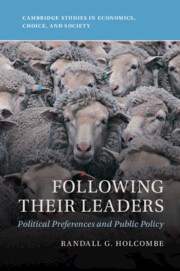Refine search
Actions for selected content:
7 results
14 - Politics as Exchange
-
- Book:
- Politics as Exchange
- Published online:
- 23 October 2025
- Print publication:
- 06 November 2025, pp 250-268
-
- Chapter
- Export citation
8 - Interest Groups
-
- Book:
- Politics as Exchange
- Published online:
- 23 October 2025
- Print publication:
- 06 November 2025, pp 127-143
-
- Chapter
- Export citation
3 - Transaction Costs and Institutions
-
- Book:
- Politics as Exchange
- Published online:
- 23 October 2025
- Print publication:
- 06 November 2025, pp 33-49
-
- Chapter
- Export citation
13 - Constraining Leviathan
-
- Book:
- Politics as Exchange
- Published online:
- 23 October 2025
- Print publication:
- 06 November 2025, pp 230-249
-
- Chapter
- Export citation
4 - Preference Aggregation through Voting
-
- Book:
- Following Their Leaders
- Published online:
- 16 March 2023
- Print publication:
- 23 March 2023, pp 56-71
-
- Chapter
- Export citation
7 - Preferences of Elites and Masses
-
- Book:
- Following Their Leaders
- Published online:
- 16 March 2023
- Print publication:
- 23 March 2023, pp 117-138
-
- Chapter
- Export citation

Following Their Leaders
- Political Preferences and Public Policy
-
- Published online:
- 16 March 2023
- Print publication:
- 23 March 2023
